0 Comments
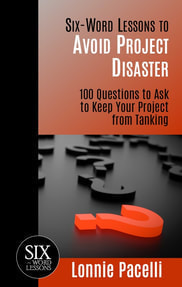 Hal was a new leader over a team of six followers. He committed to his manager that he would be a “learning leader,” and read leadership books to improve his skills. Almost every month in team meetings Hal included a book report on his latest book and the leadership techniques he wanted to put into practice. At first the team was receptive, but after the first few books a pattern emerged. Hal would talk about what he learned and implement the new methods . . . until he read the newest book on his list, making the previous book’s approach yesterday’s news—pushed aside. The team grew exasperated with Hal’s technique du jour only to have it replaced with a newer model. Even worse, the theory stayed just that, theory. Hal evaluated himself based on his knowledge; the team evaluated him based on his actions. Hal ultimately lost his team leader role; all that theory never making its way to reality. As of this writing there are over 60,000 leadership books on Amazon. Each author (including me) tries to take a unique spin on some aspect of leadership in hopes of appealing to leaders of all types. Some books have been highly influential (think The Seven Habits of Highly Effective People), while others not so much. With so many choices on the market and new ones being released all the time, a leader can get overwhelmed with the number of authors shouting at them about how to be a better leader. Even if a leader narrows his reading list down to just a few books, he is faced with what to do with the concepts the author is peddling. Perhaps it will be a discussion topic at a staff meeting, or the basis of a team-building exercise at an offsite meeting. More often than not, the hot concepts of today stay just that: concepts. Translating leadership concepts into reality that can actually grow a leader’s skills takes deliberate action. Want to be more intentional about weaving leadership concepts into your leadership fabric? Consider these five take-aways:
There’s no shortage of leadership tips and tricks any leader willing to learn can tap into. Just be intentional about what you decide to take on and focus on bringing leadership concepts to reality.  Lonnie Pacelli along with his wife Patty created the Six-Word Lessons series. He is the author of Six-Word Lessons for Project Managers, Six-Word Lessons to Avoid Project Disaster, and Six-Word Lessons for Dads with Autistic Kids. See more at lonniepacelli.com. 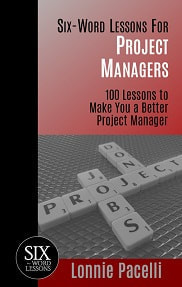 As an individual contributor, Joe was praised by his management for his speed in delivering results. His management was so enamored with his ability to get things done quickly that he was promoted to a leader role over a team of ten. Joe’s speed in taking action carried over into his decision making. He saw making decisions fast as a sign of getting “real work done,” versus sitting around talking about things. “Great leaders don’t have all the facts,” he would say to his team, as justification for moving forward without a good understanding of a decision’s implications. Joe’s team learned to just say, “Yes, Sir,” and do their best to execute what Joe wanted done by the time expected. His impulsive decision making came to a head with a new hire named Greg. Joe interviewed Greg for a product management position, who talked a great game and quickly won Joe over. Joe made an impulsive decision to hire Greg without checking his references. After Greg started working, it didn’t take long for others to see he was clearly unqualified for the position. Suspicious of Greg’s claims, Joe did some digging and found he had embellished the accomplishments on his resume. The team and Joe went through several stressful months cleaning up Greg’s messes until he was finally let go. Joe eventually recovered as a leader but learned a painful lesson about impulsive decision making; and he had to earn back credibility with his team. Before I go further, I want to level-set on what I view as impulsive and deliberate leaders. An impulsive leader prioritizes decision speed over decision quality A deliberate leader balances decision speed with decision quality Let’s break this down. Impulsive leaders want to move quickly on a decision and tend to use the concept of “imperfect information” as license to not do their homework. They are very action-oriented but run into problems from not thinking through decisions before acting. To an impulsive leader, need dates aren’t as important as moving fast. An impulsive leader may not have the time to do something right the first time, but will need extra time later to re-do or un-do something. In contrast, deliberate leaders are mindful of decision speed, but only as input into overall decision quality. They understand the concept of imperfect information, but don’t use it as an excuse to not learn what they can about a decision’s implications. They can be every bit as action oriented as an impulsive leader. What are some warning signs that you might be an impulsive leader? Here are seven:
Do any of these warning signs resonate with you? If so, then give these eight tips a look to help you make the journey from impulsive to deliberate leadership:
Remember, impulsive leaders prioritize speed over decision quality, while deliberate leaders balance speed with quality. Keep these eight tips in mind to improve the quality of your decision making and become a more effective leader of followers.  Lonnie Pacelli along with his wife Patty created the Six-Word Lessons series. He is the author of Six-Word Lessons for Project Managers, Six-Word Lessons to Avoid Project Disaster, and Six-Word Lessons for Dads with Autistic Kids. See more at lonniepacelli.com. 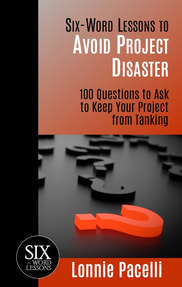 So check this out. Recently I received an email from someone who found me on LinkedIn. The person wasn’t a connection of mine, so I had no idea who he was or where he worked. Let’s go through some of the items on the email (indicated by red letters A-F) and how it influenced my impression of this person. I changed personally identifiable information and will call him John Doe. 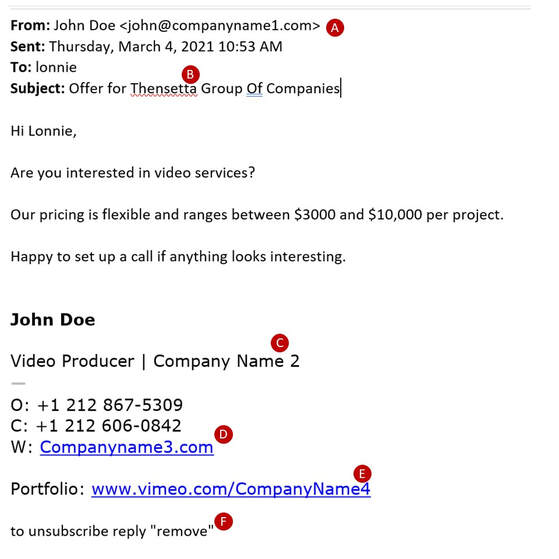 A – John’s email in the “from” line is from what I call “CompanyName1.” All good so far. B – The subject of the email is “Offer for Thensetta Group of Companies.” This seems all fine and well except my company name is “Consetta.” C – In his signature line he identifies himself as working for “Company Name 2,” which is different from the company in his email address D – His website is listed as “Companyname3.com,” which is different from both the company names in his email address and signature. What’s even more interesting is that the underlying URL is different from the listed company name. When I copied “Companyname3.com” into my browser I got a “Page Not Found” message. When I clicked on the hyperlink it took me to a parked webpage. E – The portfolio in Vimeo has yet another company name which is different than all the others. F – John tells me that if I want to stop getting emails from him I need to reply with “remove.” I presume that means to put the word “remove” in the subject line. Any reputable company uses an email service like Constant Contact or Mailchimp with a structured unsubscribe process. Needless to say, there’s no way in heck I’m going to do business with John Doe. The first impression he left was so abysmally bad that I could never imagine entrusting him with helping me resolve a business problem. I suspect that if you’ve been in business for any period of time you’ve heard the saying, “You never get a second chance to make a good first impression.” Despite this saying being as old as dirt, I’m amazed at how frequently I’ve seen professionals, both seasoned and newbie, create a negative perception in a first interaction. It’s even worse when, like the John Doe email, a negative first impression is earned through careless and reckless mistakes. The way John Doe bungled his first interaction with me told me volumes about what he might be to work with. While it’s entirely possible he is a competent professional, I’ll never know because he’ll never get a second chance with me. If you think you might need some help on creating positive first impressions, give the following six tips a look before your next meeting with someone new.
Positive first impressions matter. Creating negative first impressions through carelessness or being unprepared is just shooting yourself in the foot. Take first impressions seriously and do all you can to make your first impression impressive.  Lonnie Pacelli along with his wife Patty created the Six-Word Lessons series. He is the author of Six-Word Lessons for Project Managers, Six-Word Lessons to Avoid Project Disaster, and Six-Word Lessons for Dads with Autistic Kids. See more at lonniepacelli.com. 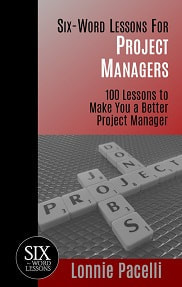 So the older I get the more I think about the lessons I’ve learned in my career. Oh, to go back in time and talk to my younger self about the boneheaded things I did. Sadly, my younger self probably wouldn’t have listened to any imparted wisdom (which I define as knowledge coupled with experience). I was recklessly confident—I didn’t think I would get burned by touching the stove, no matter how many before me got burnt. Ah, the naivete of youth. What I’ve come to realize is that learning hard lessons doesn’t mean I have to experience them first-hand. It’s far less physically, emotionally and financially painful to learn from others. This has led me to an important conclusion--there are two paths to wisdom. The first is experiential wisdom, where I know the stove is hot because I touched it. The second is inherited wisdom, where I believe someone with credibility when they tell me the stove is hot. I could have saved myself a lot of time, stress, and money if I understood and practiced inherited wisdom. In my zeal to help those still climbing the career mountain, following are my 12 wisdom nuggets to help others avoid experiential wisdom and replace it with inherited wisdom.
 Lonnie Pacelli along with his wife Patty created the Six-Word Lessons series. He is the author of Six-Word Lessons for Project Managers, Six-Word Lessons to Avoid Project Disaster, and Six-Word Lessons for Dads with Autistic Kids. See more at lonniepacelli.com. 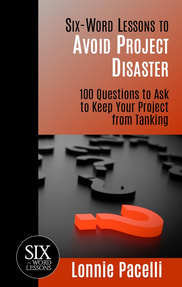 As a young manager, I was involved in a significant crisis which had the attention of not only the partners in the firm but also its CEO. I, like many of my cohorts, was nervous about the crisis, its impact on our clients, and my employment status at the firm. There was a very senior partner who was tasked by the CEO to assume responsibility for navigating the firm through the crisis. It took us a year to work our way out of the crisis; and we all learned some valuable nuggets. I thought I was a good leader before the crisis. Now I realize how naïve I was in my assessing my leadership skills. That experience, while excruciatingly painful, was an inflection point in putting me on the path to becoming a better leader. As a result of this and other crises I’ve experienced, I’ve learned a number of very valuable tenets that I adhere to when in crisis mode, as follows:
Time and time again I’ve seen crises separate great leaders from merely average leaders. If you want to be one who rises to the top of the leadership heap during a crisis, take note of the following tips:
Hey crises happen. Next time one rears its ugly head be the calmest one in the room and put these leadership actions in place to navigate through the crisis.  Lonnie Pacelli along with his wife Patty created the Six-Word Lessons series. He is the author of Six-Word Lessons for Project Managers, Six-Word Lessons to Avoid Project Disaster, and Six-Word Lessons for Dads with Autistic Kids. See more at lonniepacelli.com. 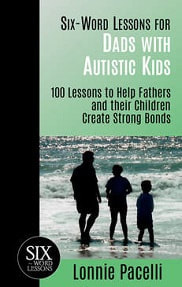 Recently I wrote an article about creating a sustained lifestyle. In the article I introduced a concept which contrasts achievement (doing something meaningful that accomplishes a desired result which gives you joy) and stress (the degree of mental, physical, or emotional strain undertaken to achieve a desired result). In the model I define four different lifestyles driven by achievements and stress, as follows:
As I’ve thought more about the achievement/stress concept, it’s occurred to me that the push-pull of achievements and stress apply to more than a person’s career or vocation. It can apply to elements such as family relationships, health, and finances. You can have high achievement/low stress in your career, but if you have low achievement/high stress in another area of your life, your overall contentment level is adversely impacted. It’s not enough to manage achievement and stress only in your career or vocation; it needs to be managed in other areas of your life as well. Given so, I adapted the good-enough contentment model I created for my Behind Gold Doors-Nine Crucial Elements to Achieve Good-Enough Contentment book to include achievement and stress as driving factors. I tested the model on myself (I ate my own dogfood as we like to say at Microsoft) and was surprised at the clarity I found in defining what good-enough contentment means to me. So, here’s the revised model, explained step-by-step:
As you work through this model there are a few considerations for you to ponder:
Maximizing achievement and minimizing stress across your life is critical to achieving good-enough contentment. Take some time to download the model and go through the exercise. Comment below with your thoughts!  Lonnie Pacelli along with his wife Patty created the Six-Word Lessons series. He is the author of Six-Word Lessons for Project Managers, Six-Word Lessons to Avoid Project Disaster, and Six-Word Lessons for Dads with Autistic Kids. See more at lonniepacelli.com. 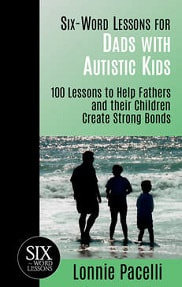 In 2004, I left Microsoft so Patty and I could homeschool our son Trevor. He was diagnosed with Autism Spectrum Disorder at age five, and we decided as he was entering seventh grade that he would need more help than what his public school could offer. I was his math and science teacher for two years until he re-entered public school in ninth grade. After my homeschooling stint, I decided to focus on writing and consulting, and later Patty and I starting a publishing business. From that point until now, I have regularly been asked if I’m “retired.” At first, I would respond with a strong “no” due to my opinion that retirees spend their days on the golf course or playing bridge. Over time, though, I recognized I had to come up with a better description of what I do as a profession. It’s not a choice of either the golf course or the 8-to-5 grind. For me, it’s something I call sustained lifestyle. So, what’s sustained lifestyle? Here’s the definition, then we’ll unpack it: Sustained lifestyle is when you have a high sense of achievement accompanied by a low degree of stress, making it something you can sustain for a long time. First let’s talk about achievement. This is about doing something meaningful that accomplishes a desired result which gives you joy. It could be delivering a project on time, helping people in need, or coaching lesser experienced professionals. It’s about getting something done that matters to you and seeing the fruits of your labor. Next is stress. This is the degree of mental, physical or emotional strain undertaken to achieve a desired result. Delivering a project on time with high-pressure executive meetings, project team infighting, and an unreasonable customer is much more taxing than one with cooperative execs, project team members, and customers. The end result is a completed project, but the execution was like pedaling uphill in tenth gear. When stress and achievement are combined in the context of lifestyle, one of the four results are realized: 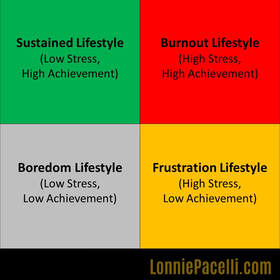 A frustration lifestyle is the result of high stress accompanied by low achievement. Think burning the midnight oil on projects that get cancelled last-minute or never used. A boredom lifestyle is the result of low stress accompanied by low achievement. Think getting up every morning with nothing to do. A burnout lifestyle is the result of high stress accompanied by high achievement. Think successive strategic projects with demanding customers, a dysfunctional team, and irrational management. A sustained lifestyle is the result of low stress accompanied by high achievement. Think volunteering for a cause you’re passionate about on your work terms. Now don’t get me wrong; I’m in no way saying that a sustained lifestyle means no stress. There are certainly things in life that crop up and cause great stress. However, a sustained lifestyle gives you margin to handle unexpected stress more effectively than if your stress bucket were already full. Here are eight tips to create a sustained lifestyle that’s enjoyable and fulfilling for you:
 Lonnie Pacelli along with his wife Patty created the Six-Word Lessons series. He is the author of Six-Word Lessons for Project Managers, Six-Word Lessons to Avoid Project Disaster, and Six-Word Lessons for Dads with Autistic Kids. See more at lonniepacelli.com.  This one is a bit of a departure from my typical article topics. Recently I wrote a book about what I call “good-enough contentment.” It’s an allegory about a forty-something man who is unhappy with his life. After a magical train ride, he learns to define what contentment means in nine areas of his life: career, family, health, friendships, finances, leisure, spirituality, giving, and legacy. Writing the story caused me to look back at my own life--the things I did well and the many mistakes I made. It inspired me to write about nine nuggets that I wish I could go back in time to tell my younger self. Some I would have done the same all over again, others radically different. All, however, are worth putting down in writing to spur your thinking about things you need to start, stop, or continue. Here they are: Career: Your career can’t take the place of family, health, leisure, and friendships – In the movie The Family Man, Nicholas Cage’s character is a hard-charging investment banker who gets to see what his life would have been like as a middle-class husband and father. He comes to realize that there’s much more to life than business. By all means, continue to vigorously pursue your career aspirations, but not at the expense of other important areas of your life. Family: Don’t squander memories – My father worked very hard as a baker; so much so that he missed out on many family events. In his last years he told me how he regretted missing so many events and milestones with my five siblings and me. Don’t look back on your life regretting not being there for the memory makers. Health: If you don’t decide to take care of yourself, the decision will be made for you – I had an emotional breakdown at age 30 due to running myself ragged both mentally and physically. I thought I could just keep pushing and tough things out. Wrong. I had no choice but to stop and make some changes to get myself healthy again. If you don’t focus on taking care of your health, something out of your control will happen to force you into action. Friendships: Have a couple of friends who would help you out at 2 am, no questions asked – Recently I was on vacation when a tenant in our rental property called and said the washing machine wasn’t working. I was 3,000 miles away and couldn’t get there, so I called a dear friend who was at the rental in 30 minutes and addressed the problem. Having a couple of close friends you can rely on to help you out of a jam is worth gold. Being someone your friend can rely on is just as important. Finances: No one cares about your finances more than you – When I graduated from college, I bought three books on investing. Those books formed the foundation for my investing discipline. At times, though, I let others who didn’t have my best interests at heart manage investments on my behalf. Now I manage every dollar myself and keep current on investment strategies. Putting your money in the hands of a paid advisor will ensure bread is put on his or her table along with your money. Do as much of this on your own as you can. Leisure: Work/life balance means slowing down, not speeding up – I’ve known way too many people who worked 60+ hours during the week only to cram “life” activities in the weekend. They had work/life balance, but it was achieved by running 100 miles per hour. Leisure time should include time to relax and recharge, so use at least some of it to rest, and be careful about trying to fit too many things into your life. Spirituality: Walk the talk on your beliefs – Whatever your spiritual beliefs (mine are Christian), don’t be a Jekyll and Hyde in what you say and what you do. Cursing up a storm in meetings during the work week then heading into church on Sunday just doesn’t square. It’s not about judging your belief system; it’s more about ensuring your actions align to your beliefs. Giving: Give out of love, not out of convenience or obligation – My son loves to cook. He regularly volunteers to cook and deliver meals to families in need. He loves to give of his time and money to help families who need a hot meal enjoy his cooking. The quantity and type of giving is up to you, just do it out of love and enjoy the gratification you get in return. Legacy: Live to your eulogy – A number of years ago I created a personal purpose statement. After a lot of soul searching, I came up with: I will work to help others to help themselves and not simply enable them. When I die, I want people to say three words at my funeral: He helped me. If you have a personal purpose or mission statement, live it. If you don’t have one, a book like The Purpose Driven Life might be helpful. My hope is that you, my readers, might be able to glean something from my nine life lessons. If I help you do or think differently about some aspect of your life, then mission accomplished. Thank you for helping me live out my purpose statement.  Lonnie Pacelli along with his wife Patty created the Six-Word Lessons series. He is the author of Six-Word Lessons for Project Managers, Six-Word Lessons to Avoid Project Disaster, and Six-Word Lessons for Dads with Autistic Kids. See more at lonniepacelli.com. 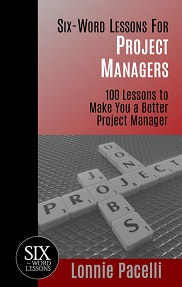 A LinkedIn interaction from some time back still sticks with me today. Why? He and I connected, then he immediately asked to review my personal finances so he could do for me what he had allegedly done for so many other “thrilled customers.” I told him “No thanks.” He replied back asking me why. Being the direct guy I am, I told him I thought it was insincere to connect with me and immediately want to review my personal finances and try to sell me on his service. He said he never asked me to send my personal finances through LinkedIn. At this point, the discussion was no longer about him trying to sell me a service; instead, I wanted to provide a teachable moment for him. I told him that sending personal finances through LinkedIn wasn’t the issue, but I didn’t want to divulge my personal finances to someone I didn’t even know who connected with me only 30 minutes ago. After another couple of interactions, he told me that “nice people” would agree to meet with him (I guess I’m not a nice person) and that he was rescinding his offer to meet (even though I already told him I didn’t want to meet with him). It was kind of like “you can’t break up with me because I’m breaking up with you first”. He then wished me the best. He made an impression on me for sure, just not one he wanted. As of this writing, LinkedIn has over 600 million users and has become a dominant force in connecting people to do business with each other. It has disrupted geographic barriers, so that someone in his basement in Cleveland can do business with someone in Los Angeles, Paris, or Bangalore. It’s also insanely cheap and easy to establish a platform and reach potential customers who 20 years ago would have been out of reach. This low barrier to entry and massive audience potential is fertile ground for ambitious businesspeople (who I refer to as LinkPitchers) to canvass large populations for business. Now I’m in no way telling the ambitious to not pursue business using LinkedIn with all their passion and energy. But there are right and wrong ways to do it. My years of LinkedIn experience have led me to seven fatal errors LinkPitchers make:
By all means use LinkedIn and the powerful tools it can bring to your business. Just keep these seven fatal errors in mind during your next LinkPitching expedition.  Lonnie Pacelli along with his wife Patty created the Six-Word Lessons series. He is the author of Six-Word Lessons for Project Managers, Six-Word Lessons to Avoid Project Disaster, and Six-Word Lessons for Dads with Autistic Kids. See more at lonniepacelli.com. |
See the Authors!
All
|

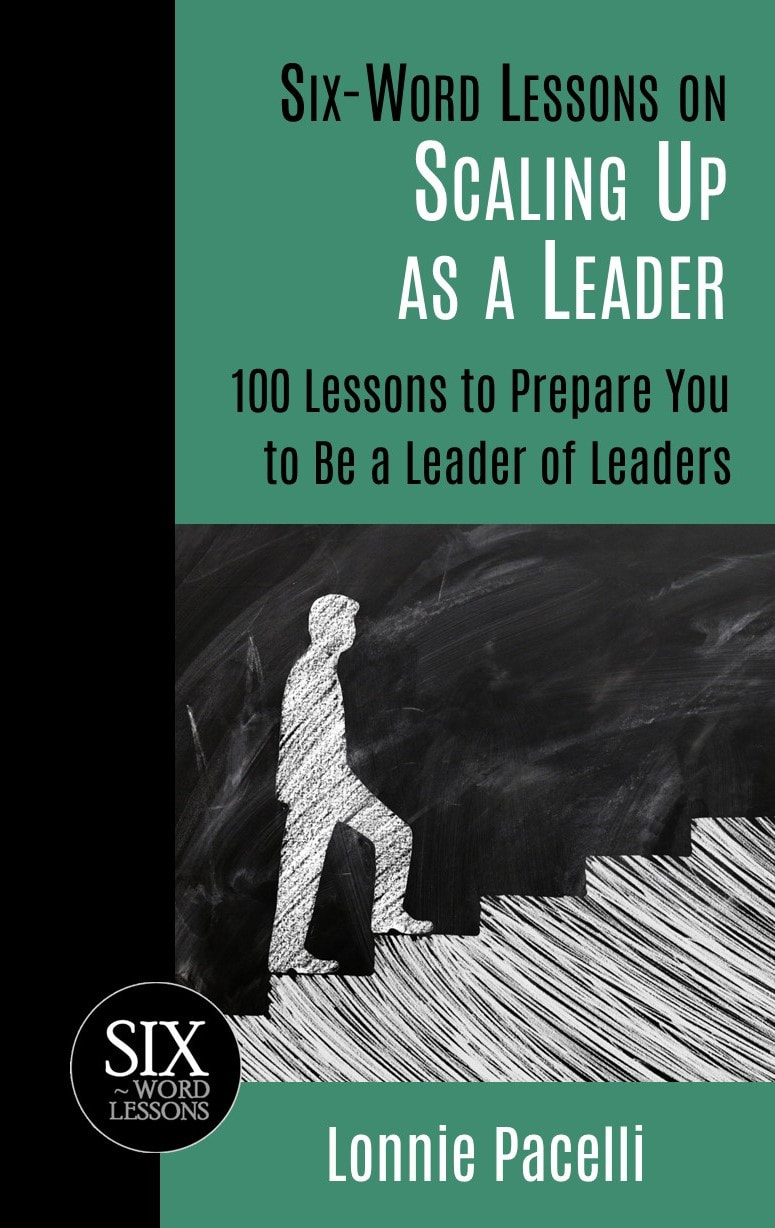
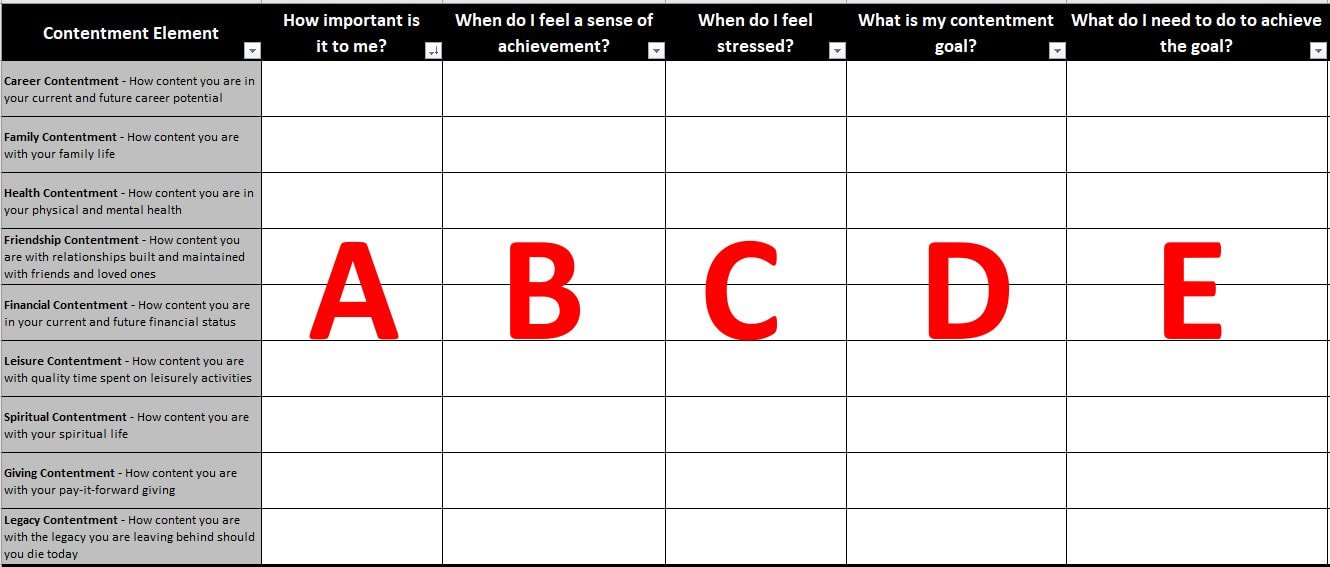
 RSS Feed
RSS Feed